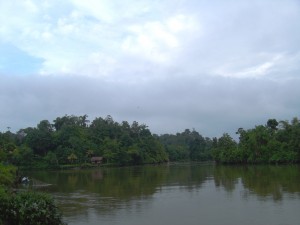On February 11 , 13 and 25 several anti-narcotics police planes fumigated coca crops, also sprayed with strong chemicals the entire area of the lower Naya basin, including agriculture lots, forests and mangroves. The Eperara Siapidaara indigenous reservation of Joaquincito and the Afro-Colombian group of women agricultural producers from the communities of Merizalde, Santa Cruz and Joaquin Grande had established seed plots where they are trying to recover traditional seed varieties and produce rice, plantains, papachina, pineapples, cassava, and aromatic and medicinal plants. After the spraying, local indigenous and Afro-Colombian authorities evaluated the extent of the damage and estimated that 80% of their subsistence crops were sprayed. They verified spraying over the mangroves, where they breed and grow hundreds of species of fish and shellfish. This is a basic attack on communities whose livelihoods depend on the mangrove ecosystem.
These fumigations endanger the lives of our families who live in the mangrove and from the mangrove, threatening our food sovereignty, and possibly triggering the mass displacement of our people from our land. We, the indigenous and Afro-Colombian authorities from Merizalde, Santa Cruz and Joaquin Grande condemn this serious damage to our crops, sources of drinking water and the health of our people, as evidenced in the community of Santa Cruz where two farmers were sprayed and have wounds on their bodies.
This is the second time in two years that our community’s food is destroyed (see press release ). On March 16, 2010, the women’s plots which are situated close to our Casa Grande, our religious and ceremonial center in the Siapidaara village were sprayes. Also at that time, the plots of our Afro-Colombian sisters from Santa Cruz were fumigated. We have been working together as Eperara and Afro women in an agro-ecological production experience, to find alternatives to illicit crops that are invading the Pacific rivers, crops that destroy community economies and sustainable forms of using the environment.
). On March 16, 2010, the women’s plots which are situated close to our Casa Grande, our religious and ceremonial center in the Siapidaara village were sprayes. Also at that time, the plots of our Afro-Colombian sisters from Santa Cruz were fumigated. We have been working together as Eperara and Afro women in an agro-ecological production experience, to find alternatives to illicit crops that are invading the Pacific rivers, crops that destroy community economies and sustainable forms of using the environment.
These damages have been committed against our indigenous and black communities, even though we have always advocated that the eradication of coca crops be done manually.
We call on neighboring communities, the Pacific Coast Community Councils, social organizations, academia, friends, and advocates of nature, and civil society in general to denounce these detrimental acts against nature and the food sources of black and indigenous communities. We call on the Regional Autonomous Corporation of Valle del Cauca (CVC) and the Ministry of the Environment to publicly explain the environmental and social implications of fumigating mangroves and creeks where water is taken for human consumption and to demand the immediate suspension of these actions.
Buenaventura, March 3, 2013
Grupo de mujeres productoras de alimentos de las comunidades de Santa Cruz,
Joaquín Grande y Puerto Merizalde.
Asociación de Cabildos Indígenas del Valle, región pacífico, ACIVA – rp
Proceso de Comunidades Negras, PCN
Colectivo de Trabajo Jenzera
